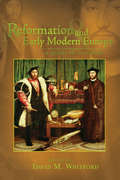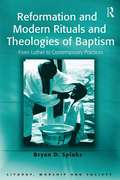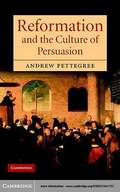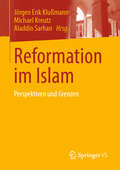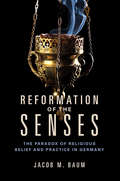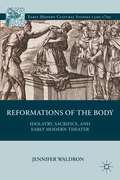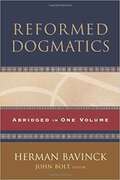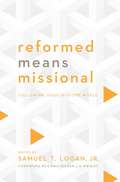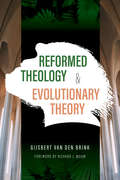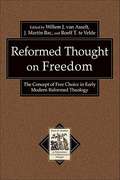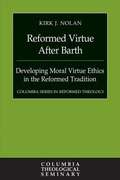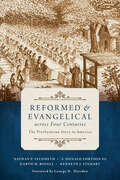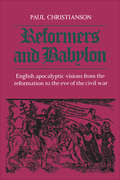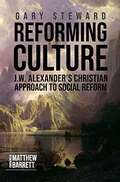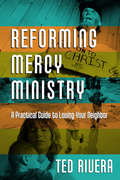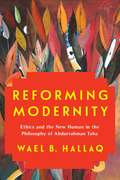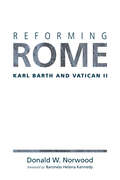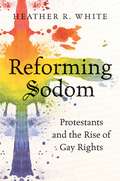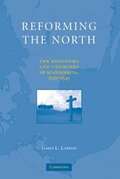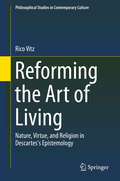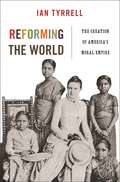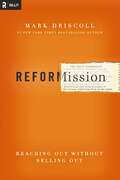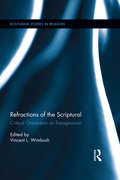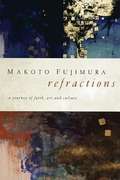- Table View
- List View
Reformation and Early Modern Europe: A Guide to Research (Sixteenth Century Essays & Studies #79)
by David M. WhitfordContinuing the tradition of historiographic studies, this volume provides an update on research in Reformation and early modern Europe. Written by expert scholars in the field, these eighteen essays explore the fundamental points of Reformation and early modern history in religious studies, European regional studies, and social and cultural studies. Authors review the present state of research in the field, new trends, key issues scholars are working with, and fundamental works in their subject area, including the wide range of electronic resources now available to researchers.Reformation and Early Modern Europe: A Guide to Research is a valuable resource for students and scholars of early modern Europe.
Reformation and Modern Rituals and Theologies of Baptism: From Luther to Contemporary Practices (Liturgy, Worship and Society Series)
by Bryan D. SpinksPresenting a comprehensive survey of the historical underpinnings of baptismal liturgies and theologies, Bryan Spinks presents an ecumenically and geographically wide-ranging survey and discussion of contemporary baptismal rites, practice and reflection, and sacramental theology. Writing within a clear chronological framework, Bryan Spinks presents two simultaneous volumes on Baptismal Liturgy and Theology. Early and Medieval Rituals and Theologies of Baptism summarizes the understandings of baptism in the New Testament and the development of baptismal reflection and liturgical rites throughout Syrian, Egyptian, Roman and African regions. In this second volume, Reformation and Modern Rituals and Theologies of Baptism, Spinks traces developments through the Reformation, liturgies in the eighteenth and nineteenth centuries, and explores important new ecumenical perspectives on developments of twentieth-century sacramental discussion. Present practices of Baptist, Amish, as well as Methodist, Roman Catholic, Lutheran, Reformed and Anglican denominations are also examined.
Reformation and the Culture of Persuasion
by Andrew PettegreeWhy did people choose the Reformation? What was in the evangelical teaching that excited, moved or persuaded them? Andrew Pettegree tackles these questions directly by re-examining the reasons that moved millions to this decisive and traumatic break with a shared Christian past. He charts the separation from family, friends, and workmates that adherence to the new faith often entailed and the new solidarities that emerged in their place. He explores the different media of conversion through which the Reformation message was communicated and the role of drama, sermons, song and the book. His findings offer a persuasive new answer to the critical question of how the Reformation could succeed as a mass movement in an age before mass literacy.
Reformation im Islam: Perspektiven und Grenzen
by Jörgen Erik Klußmann Michael Kreutz Aladdin SarhanDass der Islam in der modernen Welt, die von Demokratie, Säkularismus und Fortschritt geprägt ist, nur bestehen könne, wenn er eine Reformation durchlaufe, wird von den einen behauptet, von den anderen bestritten und ist Gegenstand einer bis heute andauernden Debatte, die sich mindestens bis auf das frühe 20. Jahrhundert zurückverfolgen lässt. Dieser Sammelband lässt Stimmen für und wider eine Reformation im Islam zu Wort kommen und rückt die Debatte in das Licht aktueller Ereignisse und Herausforderungen, zu denen nicht zuletzt der Aufstieg des Salafismus gehört. Der InhaltEinführungReformation als HerausforderungIslam und PolitikReformation und die Geschlechterfrage Vergleichende PerspektivenDie ZielgruppenPhilosophenTheologenSozialwissenschaftlerPolitik- und ReligionswissenschaftlerHistorikerDie HerausgeberJörgen Erik Klußmann ist Studienleiter an der Evangelischen Akademie im Rheinland und nebenberuflich Coach und Trainer für soziokulturelle und religiöse Sensibilisierung sowie für systemische Konflikttransformation.Dr. Michael Kreutz ist Politologe und Orientalist in Bochum mit den Arbeitsschwerpunkten Moderne Geschichte des Nahen Ostens und Südosteuropas, politische Ideengeschichte, Europa und der Islam, Religion und Politik.Aladdin Sarhan ist Islamwissenschaftlicher Referent und Sachverständiger in der Abteilung Staatsschutz des Landeskriminalamts Rheinland-Pfalz.
Reformation of the Senses: The Paradox of Religious Belief and Practice in Germany (Studies in Sensory History)
by Jacob M. BaumWe see the Protestant Reformation as the dawn of an austere, intellectual Christianity that uprooted a ritualized religion steeped in stimulating the senses--and by extension the faith--of its flock. Historians continue to use the idea as a potent framing device in presenting not just the history of Christianity but the origins of European modernity. Jacob M. Baum plumbs a wealth of primary source material from the fifteenth and sixteenth centuries to offer the first systematic study of the senses within the religious landscape of the German Reformation. Concentrating on urban Protestants, Baum details the engagement of Lutheran and Calvinist thought with traditional ritual practices. His surprising discovery: Reformation-era Germans echoed and even amplified medieval sensory practices. Yet Protestant intellectuals simultaneously cultivated the idea that the senses had no place in true religion. Exploring this paradox, Baum illuminates the sensory experience of religion and daily life at a crucial historical crossroads. Provocative and rich in new research, Reformation of the Senses reevaluates one of modern Christianity's most enduring myths.
Reformations Of The Body
by Jennifer WaldronThis project takes the human body and the bodily senses as joints that articulate new kinds of connections between church and theatre and overturns a longstanding notion about theatrical phenomenology in this period.
Reformed Dogmatics: Abridged in One Volume
by John Bolt Herman BavinckHerman Bavinck's four-volume Reformed Dogmatics is one of the most important theological works of the twentieth century. The recently completed English translation has received wide acclaim. <p><p> Now John Bolt, one of the world's leading experts on Bavinck and editor of Bavinck's four-volume set, has abridged the work in one volume, offering students, pastors, and lay readers an accessible summary of Bavinck's masterwork. This volume presents the core of Bavinck's thought and offers explanatory materials, making available to a wider audience some of the finest Dutch Reformed theology ever written.
Reformed Means Missional: Following Jesus into the World
by Samuel T. LoganChristians are not on a mission for God; his church is on his mission--the mission of bringing the grace of Christ to sinners; the mission of bringing the whole world into obedience to Christ; and the mission of filling the world with his fame and glory. Being on God's mission means following Jesus into the world, often an evil and frightening place. It is a place of idolatry, relativism, and secularism; it is a place where sexual abuse and child abuse occur; it is a place of pain and poverty and disease; it is a place of sexual dysfunction. But it was to this place that Jesus came, and we do him honor as we follow him into the world bringing the good news of the total redeeming work of Christ.Reformed Means Missional gathers Reformed leaders from all across the globe to demonstrate why and how the church must be on God's mission of bringing grace, holiness, compassion, and justice to a world of sin and suffering.
Reformed Theology and Evolutionary Theory
by Gijsbert Van den BrinkMany books aim to help beginners explore whether or not evolutionary science is compatible with Christian faith. This one probes more deeply to ask: What do we learn from modern evolutionary science about key issues that are of special theological concern? And what does Christian theology, especially in its Reformed expressions, say about those same key issues? Gijsbert van den Brink begins by describing the layers of meaning in the phrase &“evolutionary theory&” and exploring the question of how to interpret the Bible with regard to science. He then works through five key areas of potential conflict between evolutionary theory and Christian faith, spelling out scientific findings and analyzing Christian doctrinal concerns along the way. His conclusion: although some traditional doctrinal interpretations must be adjusted, evolutionary science is no obstacle to classical Christian faith.
Reformed Thought on Freedom: The Concept of Free Choice in Early Modern Reformed Theology
by J. Martin Bac Richard Muller Willem J. Van Asselt Roelf T. Te VeldeThis book makes a major contribution to historical scholarship on the problem of free choice and to contemporary debates over determinism and divine foreknowledge of future events. It fills a significant gap in Reformed knowledge by presenting sources in translation and commentary on works of major importance to the Protestant tradition that have been neglected for centuries. The book begins with an introductory discussion of free choice and the Reformed tradition and then moves on to examine the concept of freedom in the work of six early modern Reformers: Girolamo Zanchi, Franciscus Junius, Franciscus Gomarus, Gisbertus Voetius, Francesco Turrettini, and Bernardinus de Moor. It will be valued by all students of Reformed theology.
Reformed Virtue After Barth: Developing Moral Virtue Ethics in the Reformed Tradition
by Kirk J. NolanWith its focus on the traditions and communities that form us over the course of a lifetime, virtue ethics has richly expanded our understanding of what the Christian life can look like. Yet its emphasis on human virtues and habits of mind and life seems inconsistent with the Reformed tradition's insistence that sin lies at the heart of the human condition. For this reason, virtue ethics seems out of place in Reformed theology, especially in the company of the Reformed tradition's greatest twentieth-century theologian, Karl Barth. In this new addition to the Columbia Series in Reformed Theology, Kirk Nolan argues that Barth's theology actually proves virtue ethics can be compatible with the Reformed tradition. Rather than see virtue as an inevitable and natural process of growth, Barth helps us understand that development in the Christian life comes through a process of repetition and renewal, and that all virtue comes solely as a gift from God. Nolan establishes an important bridge between Reformed moral teaching and the tradition of virtue ethics.
Reformed and Evangelical across Four Centuries: The Presbyterian Story in America
by Garth M. Rosell Kenneth J. Stewart Nathan Feldmeth S. Donald Fortson IIIA definitive history of evangelical Presbyterianism in America Reformed and Evangelical across Four Centuries tells the story of the Presbyterian church in the United States, beginning with its British foundations and extending to its present-day expression in multiple American Presbyterian denominations. This account emphasizes the role of the evangelical movement in shaping various Presbyterian bodies in America, especially in the twentieth century amid increasing departures from traditional Calvinism, historic orthodoxy, and a focus on biblical authority. Particular attention is also given to crucial elements of diversity in the Presbyterian story, with increasing numbers of African American, Latino/a, and Korean American Presbyterians—among others—in the twenty-first century. Overall, this book will be a bountiful resource to anyone curious about what it means to be Presbyterian in the multidimensional American context, as well as to anyone looking to understand this piece of the larger history of Christianity in the United States.
Reformers and Babylon: English Apocalyptic Visions from the Reformation to the Eve of the Civil War
by Paul Kenneth ChristiansonStarting in the 1530s with John Bale, English reformers found in the apocalyptic mysteries of the Book of Revelation a framework for reinterpreting the history of Christianity and explaining the break from the Roman Catholic Church. Identifying the papacy with antichrist and the Roman Catholic Church with Babylon, they pictured the reformation as a departure from the false church that derived its jurisdiction from the devil. Those who took the initiative in throwing off the Roman yoke acted as instruments of God in the cosmic warfare against the power of evil that raged in the latter days of the world. The reformation ushered in the beginning of the end as prophesied by St. John.Reformers and Babylon examines the English apocalyptic tradition as developed in the works of religious thinkers both within and without the Established Church and distinguishes the various streams into which the tradition split. By the middle of Elizabeth's reign the mainstream apocalyptic interpretation was widely accepted within the Church of England. Under Charles I, however, it also provided a vocabulary of attack for critics of the Established Church. Using the same weapons that their ancestors had used to justify the reformation in the first place, reformers like John Bastwick, Henry Burton, William Prynne, and John Lilburne attacked the Church of England's growing sympathies with Romish ways and eventually prepared parliamentarians to take up arms against the royalist forces whom they saw as the forces of antichrist. Scholars of sixteenth- and seventeenth-century intellectual history will welcome this closely reasoned study of the background of religious dissent which underlay the politics of the time.
Reforming Culture: J. W. Alexander's Christian Approach To Social Reform
by Matthew Barrett Gary StewardHow should we address the social ills in our culture? How should we respond to the social and economic inequalities around us? James W. Alexander (1804-1859) thought deeply about these problems and wrote extensively about how these issues might be addressed from a Christian perspective. The son of Princeton Seminary's first faculty member, Alexander rose to prominence in the nineteenth century as a Christian leader in Virginia, New Jersey, and New York City. While he authored numerous books and articles, Alexander's contribution to evangelical thought has largely been overlooked. Alexander was deeply concerned about the economic, political, and social structures of antebellum American society, and he left behind a great deal of material that addressed these issues. In an age when social reformers traversed America with an abundance of novel ideas and utopian schemes, Alexander believed that the Christian gospel and the influence of Christian truth was the best means approach for bringing about lasting good in the world around us. Alexander's thoughts on government, economics, education, and race continue to be relevant for our own day. While the complexion of our social ills may have changed, the solution to needs of our culture have largely remained the same.
Reforming Mercy Ministry: A Practical Guide to Loving Your Neighbor
by Ted RiveraReforming Mercy Ministry
Reforming Modernity: Ethics and the New Human in the Philosophy of Abdurrahman Taha
by Wael HallaqReforming Modernity is a sweeping intellectual history and philosophical reflection built around the work of the Morocco-based philosopher Abdurrahman Taha, one of the most significant philosophers in the Islamic world since the colonial era. Wael B. Hallaq contends that Taha is at the forefront of forging a new, non-Western-centric philosophical tradition. He explores how Taha’s philosophical project sheds light on recent intellectual currents in the Islamic world and puts forth a formidable critique of Western and Islamic modernities.Hallaq argues that Taha’s project departs from—but leaves behind—the epistemological grounds in which most modern Muslim intellectuals have anchored their programs. Taha systematically rejects the modes of thought that have dominated the Muslim intellectual scene since the beginning of the twentieth century—nationalism, Marxism, secularism, political Islamism, and liberalism. Instead, he provides alternative ways of thinking, forcefully and virtuosically developing an ethical system with a view toward reforming existing modernities. Hallaq analyzes the ethical thread that runs throughout Taha’s oeuvre, illuminating how Taha weaves it into a discursive engagement with the central questions that plague modernity in both the West and the Muslim world. The first introduction to Taha’s ethical philosophy for Western audiences, Reforming Modernity presents his complex thought in an accessible way while engaging with it critically. Hallaq’s conversation with Taha’s work both proffers a cogent critique of modernity and points toward answers for its endemic and seemingly insoluble problems.
Reforming Rome: Karl Barth and Vatican II
by Donald W. NorwoodFew people realize that Karl Barth, one of the twentieth century’s greatest Protestant theologians, was among a select group of non-Catholic guests who were invited to the Second Vatican Council (1962–65) to assist in the reform and renewal of the Roman Catholic Church. In Reforming Rome Donald Norwood offers the first book-length study of Barth’s involvement with Vatican II and his significant impact on the reform of the Catholic Church.Norwood examines Barth’s critical engagement with the Roman Catholic Church from his time at the (Catholic) University of Munster to his connection with Vatican II, his conversations with Pope Paul VI, and seminars and interviews he gave about the Council afterward. On the basis of extensive research, Norwood amplifies Barth’s own very brief account of Vatican II.Barth himself often felt that he was better understood by Roman Catholics such as Hans Küng, Hans Urs von Balthasar, and Joseph Ratzinger than he was by his own Reformed colleagues. This study, written by a fellow Reformed theologian, helps us to see why.
Reforming Sodom
by Heather Rachelle WhiteWith a focus on mainline Protestants and gay rights activists in the twentieth century, Heather R. White challenges the usual picture of perennial adversaries with a new narrative about America's religious and sexual past. White argues that today's antigay Christian traditions originated in the 1920s when a group of liberal Protestants began to incorporate psychiatry and psychotherapy into Christian teaching. A new therapeutic orthodoxy, influenced by modern medicine, celebrated heterosexuality as God-given and advocated a compassionate "cure" for homosexuality.White traces the unanticipated consequences as the therapeutic model, gaining popularity after World War II, spurred mainline church leaders to take a critical stance toward rampant antihomosexual discrimination. By the 1960s, a vanguard of clergy began to advocate for homosexual rights. White highlights the continued importance of this religious support to the consolidating gay and lesbian movement. However, the ultimate irony of the therapeutic orthodoxy's legacy was its adoption, beginning in the 1970s, by the Christian Right, which embraced it as an age-old tradition to which Americans should return. On a broader level, White challenges the assumed secularization narrative in LGBT progress by recovering the forgotten history of liberal Protestants' role on both sides of the debates over orthodoxy and sexual identity.
Reforming The North: The Kingdoms and Churches of Scandinavia, 1520-1545
by James L. LarsonThe turbulence of the Protestant Reformation marks a turning point in European history, but the Scandinavian contribution to this revolution is not well known outside the Northern world. Reforming the North focuses on twenty-five years (1520-1545 A.D.) of this history, during which Scandinavians terminated the medieval Union of Kalmar, toppled the Catholic Church, ended the commercial dominance of the German Hanse, and laid the foundations for centralized states on the ruins of old institutions and organizations. This book traces the chaotic and often violent transfer of resources and authority from the decentralized structures of medieval societies to the early modern states and their territorial churches. Religious reform is regarded as an essential element in the process - in the context of social unrest, political conflict, and long-term changes in finance, trade, and warfare. Reforming the North offers a broad perspective on this turbulent period and on the implications of the Protestant Reformation for Northern history.
Reforming the Art of Living
by Rico VitzDescartes's concern with the proper method of belief formation is evident in the titles of his works--e. g. , The Search after Truth, The Rules for the Direction of the Mind and The Discourse on Method of rightly conducting one's reason and seeking the truth in the sciences. It is most apparent, however, in his famous discussions, both in the Meditations and in the Principles, of one particularly noteworthy source of our doxastic errors--namely, the misuse of one's will. What is not widely recognized, let alone appreciated and understood, is the relationship between his concern with belief formation and his concern with virtue. In fact, few seem to realize that Descartes regards doxastic errors as moral errors and as sins both because such errors are intrinsically vicious and because they entail notably deleterious social consequences. Reforming the Art of Living seeks to rectify this rather common oversight in two ways. First, it aims to elucidate the nature of Descartes's account of virtuous belief formation. Second, it aims both (i) to illuminate the social significance of Descartes's philosophical program as it relates to the understanding and practice not of science, but of religion and (ii) to develop a kind of Leibnizian critique of this aspect of his program. More specifically, it aims to show that Descartes's project is "dangerous," insofar as it is subversive not only of traditional Christianity but also of other traditional forms of religion, both in theory and in practice.
Reforming the World: The Creation of America's Moral Empire (America in the World #4)
by Ian TyrrellReforming the World offers a sophisticated account of how and why, in the late nineteenth and early twentieth centuries, American missionaries and moral reformers undertook work abroad at an unprecedented rate and scale. Looking at various organizations such as the Young Men's Christian Association and the Student Volunteer Movement for Foreign Missions, Ian Tyrrell describes the influence that the export of American values had back home, and explores the methods and networks used by reformers to fashion a global and nonterritorial empire. He follows the transnational American response to internal pressures, the European colonies, and dynamic changes in global society. Examining the cultural context of American expansionism from the 1870s to the 1920s, Tyrrell provides a new interpretation of Christian and evangelical missionary work, and he addresses America's use of "soft power." He describes evangelical reform's influence on American colonial and diplomatic policy, emphasizes the limits of that impact, and documents the often idiosyncratic personal histories, aspirations, and cultural heritage of moral reformers such as Margaret and Mary Leitch, Louis Klopsch, Clara Barton, and Ida Wells. The book illustrates that moral reform influenced the United States as much as it did the colonial and quasi-colonial peoples Americans came in contact with, and shaped the architecture of American dealings with the larger world of empires through to the era of Woodrow Wilson. Investigating the wide-reaching and diverse influence of evangelical reform movements, Reforming the World establishes how transnational organizing played a vital role in America's political and economic expansion.
Reformission: Reaching Out without Selling Out
by Mark DriscollIf the unchurched in the United States ever formed their own country, it would be the world’s eleventh most populous nation. Reformission is a call to reform a flawed view of missions—as something we only do in foreign lands—to focus on the urgent needs in our own neighborhoods, filled with diverse Americans who desperately need the Gospel of Jesus and life in his Church. It calls for a movement of missionaries who seek the lost across the street, as well as across the globe. Many evangelical churches today are either hostile to the unbelieving world in which they live, or so friendly with the surrounding culture that they have lost the unique claims of the gospel that alone have the power to change people. This basic primer on the interface between gospel and culture by #1 New York Times bestselling author and pastor Mark Driscoll will help you to carefully navigate between the twin pitfalls of syncretism (being so culturally irrelevant that you lose your message) and sectarianism (being so culturally irrelevant that you lose your mission). If you’re more convinced today than ever that this crazy, sin-sick world needs a Savior, Reformission will show you how to love the Lord through the unchanging gospel, and love your neighbor in our ever-changing culture.
Refractions of the Scriptural: Critical Orientation as Transgression (Routledge Studies in Religion)
by Vincent L. WimbushRefractions of the Scriptural is a transdisciplinary collection of essays that seeks to construct a new field of scholarly inquiry with scriptures as a fraught category, analytical wedge, and site for excavation and problematization. The book focuses on the ways in which individual and social bodies manipulate—and are manipulated by— the politics and power encoded in language and formalized canonical knowledge. Scriptures, in this sense, function as complex phenomena that are instrumental to social conservatism as well as social critique and social change. The essays in this volume, written by established and up-and-coming scholars across a wide range of disciplines, seek to locate, engage, and interpret the ways in which the scriptural shapes and reshapes people and the dynamics of identity formation. The chapters are organized around four domains or types of inquiry: the cognitive, the conscientized, the inscriptive, and the formative. It will be of interest to scholars of religion, as well as those interested more broadly in critical social and historical studies.
Refractions: A Journey Of Faith, Art, And Culture
by Makoto FujimuraA collection of essays, thoughts, and prayers from award-winning artist Makoto Fujimura, Refractions brings people of all backgrounds together in conversation and meditation on culture, art, and humanity.
Reframe Your Life
by Stephen ArterburnEveryone needs a way to break free from the pain of their past. By explaining and illuminating a psychological technique known as "reframing," bestselling author Stephen Arterburn puts readers on the path to freedom from old wounds. Arterburn realizes that in many cases, traumas are so severe that individuals feel unable to take even the most basic steps toward healing. REFRAME YOUR LIFE instructs readers on how to view hurtful events through a more informed frame of reference, allowing them to look at dark moments from a broader perspective than the events themselves and empowering them to step into a brighter future.
